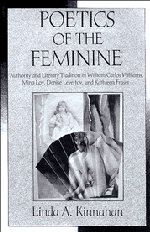 Poetics of the Feminine
Poetics of the Feminine Book contents
- Frontmatter
- Contents
- Acknowledgments
- Introduction
- 1 “The Full of My Freed Voice”: Williams and Loy, Feminism and the Feminine
- 2 In The American Grain: Proclaiming a Feminine Ground
- 3 Denise Levertov: The Daughter's Voice
- 4 Kathleen Fraser: A Tradition of Marginality
- Conclusion: Paterson and the Question of Authority
- Notes
- Bibliography
- Index
- CAMBRIDGE STUDIES IN AMERICAN LITERATURE AND CULTURE
Conclusion: Paterson and the Question of Authority
Paterson and the Question of Authority
Published online by Cambridge University Press: 08 January 2010
- Frontmatter
- Contents
- Acknowledgments
- Introduction
- 1 “The Full of My Freed Voice”: Williams and Loy, Feminism and the Feminine
- 2 In The American Grain: Proclaiming a Feminine Ground
- 3 Denise Levertov: The Daughter's Voice
- 4 Kathleen Fraser: A Tradition of Marginality
- Conclusion: Paterson and the Question of Authority
- Notes
- Bibliography
- Index
- CAMBRIDGE STUDIES IN AMERICAN LITERATURE AND CULTURE
Summary
How strange you are, you idiot!
So you think because the rose
is red that you shall have the mastery?
–William Carlos WilliamsWriting from an analogous position to the one taken in this study, Rachel Blau DuPlessis confronts Paterson in the essay “Pater-Daughter.” She asks:
What is missing what what is missing what omitted. what is missing? a way of mediating between Mme. Curie's creative stubbornness and the voiceless / over-voiced other woman – Cress. A way of mediating between sex and text, between gender and writing as a struggle within the production, so a struggle within the reading of this work. (40)
How the daughter reads this text is intimately bound up with the positions of father, daughter, and son in the poem. These positions, in turn, are inextricably linked to matters of authority and tradition that we have investigated within Williams's early works and in his relationship to women poets. How does Williams's “magnum opus,” as he called it, translate the issues of authority embedded within gender scripts from his earlier experimental works to his late epic (SL 163)? In the move from a defamiliarizing language of contact to a symbolic mythic structure asserting a familiar epic authority, “what is missing” and what remains?
Despite the criticism of a “father to son” modernism leveled by Williams against Joyce and Pound in the 1946 “Letter to an Australian Editor,” he had incorporated just such a scheme in the first book of Paterson, published contemporaneously.
- Type
- Chapter
- Information
- Poetics of the FeminineAuthority and Literary Tradition in William Carlos Williams, Mina Loy, Denise Levertov, and Kathleen Fraser, pp. 237 - 247Publisher: Cambridge University PressPrint publication year: 1994


